Formal Sorry Letter to a Boss for a Mistake at Work
Subject: Sincere Apology for My Recent Mistake
Dear [Manager’s Name],
I am writing this letter to express my deepest apologies for the mistake I made regarding [specific issue]. I take full responsibility for my actions and understand the inconvenience it has caused to both the team and the organization.
Please know that the error was unintentional, and I am already taking steps to ensure it does not happen again. I’ve reviewed the process thoroughly and implemented additional checks to avoid future oversights.
Once again, I am sincerely sorry for my mistake and any trouble it has caused. I deeply value your understanding and will strive to regain your trust through consistent performance.
Sincerely,
[Your Name]
Heartfelt Sorry Email to a Friend
Subject: I’m Truly Sorry, My Friend
Hey [Friend’s Name],
I’ve been thinking a lot about what happened, and I can’t shake off the guilt. I realize my words/actions hurt you, and that was never my intention. You mean a lot to me, and I hate that I made you feel upset.
Please know that I’m genuinely sorry. I should have handled things differently. If you’re open to it, I’d love to meet and talk things through—I miss our conversations.
Take all the time you need. I’ll be here when you’re ready.
Warmly,
[Your Name]
Professional Sorry Letter to a Client for Poor Service
Subject: Apology for the Inconvenience Caused
Dear [Client’s Name],
Please accept my sincere apologies for the inconvenience you experienced with [describe issue]. We value your trust in our company and are deeply sorry that we did not meet your expectations on this occasion.
We take full responsibility and have already addressed the root cause to ensure such an issue does not recur. Our team is committed to restoring your confidence and delivering the high-quality service you deserve.
We truly appreciate your patience and understanding. Thank you for giving us the opportunity to make things right.
Kind regards,
[Your Name]
[Your Position]
[Company Name]
Casual Sorry Message to a Partner
Subject: I Messed Up, and I’m Sorry
Hey [Partner’s Name],
I know I hurt you, and I can’t stop thinking about it. You didn’t deserve that, and I feel awful for making you feel that way. I let my emotions get the better of me, and I regret it deeply.
Please forgive me. I’ll do whatever it takes to make things right between us because you mean everything to me. Let’s talk soon—I miss you more than you can imagine.
Love,
[Your Name]
Official Sorry Letter to a Teacher for Misbehavior
Subject: Apology for My Behavior in Class
Dear [Teacher’s Name],
I would like to sincerely apologize for my behavior during your class on [date]. I realize that my actions were disrespectful and disrupted the learning environment. I regret my conduct and understand how inappropriate it was.
I assure you that this incident has taught me an important lesson about respect and responsibility. I will make every effort to maintain proper behavior in your class moving forward.
Thank you for your patience and understanding.
Sincerely,
[Your Name]
[Class/Grade]
Quick Sorry Email for Missing a Meeting
Subject: Apology for Missing the Meeting
Dear [Recipient’s Name],
I sincerely apologize for not attending the meeting scheduled for [date/time]. Unfortunately, [brief reason—e.g., unexpected conflict or emergency] prevented me from joining on time.
I understand the importance of the meeting and regret any inconvenience my absence may have caused. Please share any notes or decisions discussed so I can catch up and contribute as needed.
Thank you for your understanding and patience.
Best regards,
[Your Name]
Creative Sorry Message for Social Media Mistake
Subject: A Public Apology—Owning My Mistake
Hi Everyone,
I’d like to take a moment to sincerely apologize for my recent post on [platform]. In hindsight, I realize it was insensitive and poorly worded. My intention was never to offend anyone, but I understand the impact it had.
I’ve learned from this experience and will be more mindful in the future. Thank you to those who pointed it out respectfully—it means a lot. I hope to move forward positively, with lessons learned.
Sincerely,
[Your Name]
Funny Yet Sincere Sorry Message to a Colleague
Subject: My Bad—Apology for Yesterday!
Hey [Colleague’s Name],
I owe you a big apology for [describe funny or harmless mistake]. I promise I didn’t mean to turn your day upside down—it just kind of… happened! Consider this my official “sorry” (and maybe a coffee bribe? ☕).
On a serious note, I appreciate your patience and good humor. Thanks for being awesome about it—I’ll make it up to you!
Cheers,
[Your Name]
Serious Sorry Letter for Missing a Deadline
Subject: Apology for Missing Project Deadline
Dear [Recipient’s Name],
I sincerely apologize for not meeting the deadline for [project/task name]. I understand the importance of timely delivery and acknowledge that my delay has impacted the workflow and team schedule.
I take full responsibility for the oversight. I have already created a revised plan to complete the pending tasks as soon as possible and prevent this from recurring. Thank you for your patience and understanding.
Sincerely,
[Your Name]
Simple Sorry Letter to a Neighbor
Subject: Apology for the Inconvenience
Dear [Neighbor’s Name],
I’m writing to sincerely apologize for the disturbance caused by [describe situation—e.g., loud noise, parking issue, etc.]. It was unintentional, and I completely understand how inconvenient it must have been for you.
Please accept my apology. I’ll make sure it doesn’t happen again. Thank you for your understanding and for being a considerate neighbor.
Warm regards,
[Your Name]
What is a Sorry Application Letter and Why It Matters
A Sorry Application Letter is a written apology used to express regret and take responsibility for an action, mistake, or misunderstanding. It shows maturity, accountability, and sincerity in maintaining relationships—whether personal, academic, or professional. Sending such a letter can rebuild trust and demonstrate respect for the recipient’s feelings or position.
Who Should Write a Sorry Application Letter
Anyone who has made a mistake, caused harm, or failed to meet expectations can write a sorry letter. This includes employees, students, friends, business owners, and public figures. The key is that it should come directly from the person responsible—authenticity is crucial for the apology to feel genuine.
Whom to Address the Sorry Letter To
The recipient depends on the situation.
- For professional matters: address your supervisor, client, or colleague.
- For personal relationships: write directly to your friend, family member, or partner.
- For academic settings: address your teacher or principal.
- For public matters: direct your message to affected groups or individuals respectfully.
When to Send a Sorry Application Letter
Timing is essential. Send the letter:
- Immediately after realizing your mistake.
- When tensions are still fresh but before they escalate.
- After collecting your thoughts to ensure sincerity.
Avoid delaying too long, as late apologies may appear insincere or forced.
How to Write and Send a Sorry Application Letter
Follow these steps:
- Acknowledge the mistake honestly.
- Apologize sincerely using clear language.
- Take responsibility—avoid excuses.
- Offer a solution or describe corrective actions.
- Close politely and express hope for understanding.
Letters can be hand-delivered, mailed, or emailed depending on the relationship and formality level.
Formatting and Tone Guidelines
- Length: Usually one page or 150–250 words.
- Tone: Match the situation—formal for work, personal for friends or family.
- Style: Direct, humble, and emotionally appropriate.
- Structure: Subject → Greeting → Apology → Explanation → Resolution → Closing.
- Mode: Digital for quick apologies; printed letters for formal cases.
Common Mistakes to Avoid
- Being vague or insincere.
- Making excuses or blaming others.
- Over-apologizing to the point of discomfort.
- Forgetting to offer a resolution or follow-up.
- Using humor when the situation is serious.
Follow-up Actions After Sending the Letter
After sending, give the recipient time to respond. If you don’t hear back, follow up politely after a few days. Continue demonstrating changed behavior—actions reinforce your words. In professional cases, document your apology and corrective steps for accountability.
Tricks and Tips for Writing an Effective Sorry Letter
- Write when calm and collected.
- Use “I” statements to take ownership.
- Be brief but heartfelt.
- Avoid overcomplicated language—keep it natural.
- End with gratitude for the person’s understanding.
Pros and Cons of Sending a Sorry Application Letter
Pros:
- Repairs damaged relationships.
- Shows professionalism and emotional maturity.
- Can prevent escalation or disciplinary action.
Cons:
- Poorly written apologies may worsen the issue.
- Insincere tone can harm credibility.
- Not all recipients are ready to forgive immediately.
Elements and Structure of a Proper Sorry Letter
A complete sorry letter typically includes:
- Subject line or headline.
- A clear apology statement.
- Explanation or context (brief).
- Acknowledgment of the impact.
- Corrective measures or solutions.
- Closing statement expressing gratitude or hope for understanding.
Comparison with Verbal Apologies
Unlike a spoken apology, a written sorry letter is permanent, more thoughtful, and suitable for official or distant situations. Verbal apologies are spontaneous and emotional, while written ones allow time to reflect and choose words carefully. Many people combine both for the strongest impact.
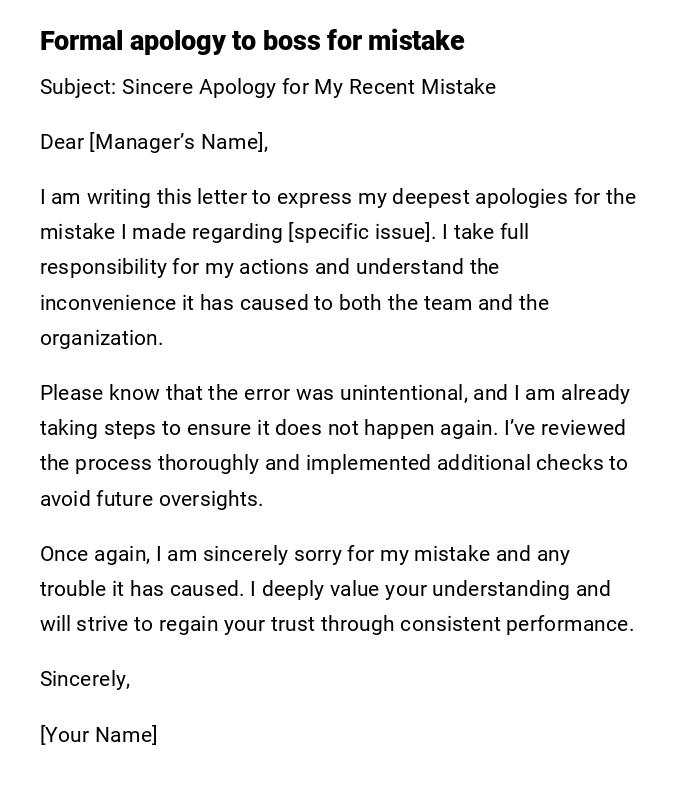
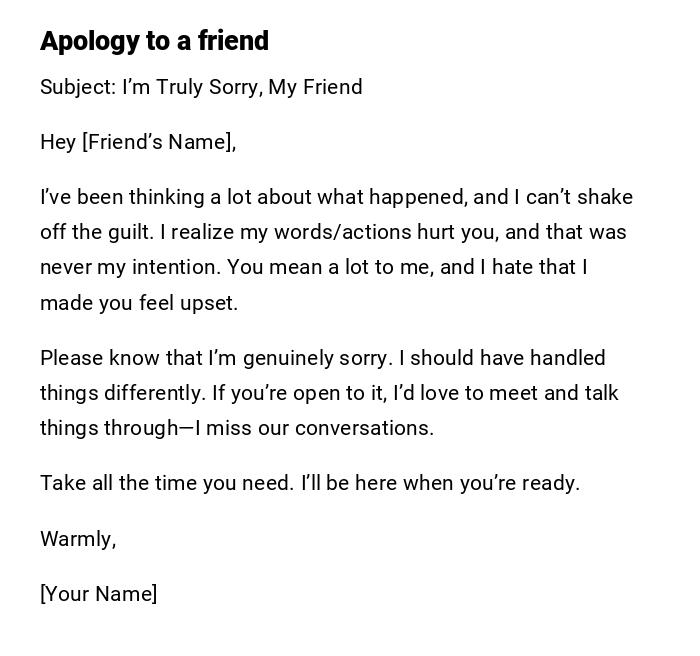
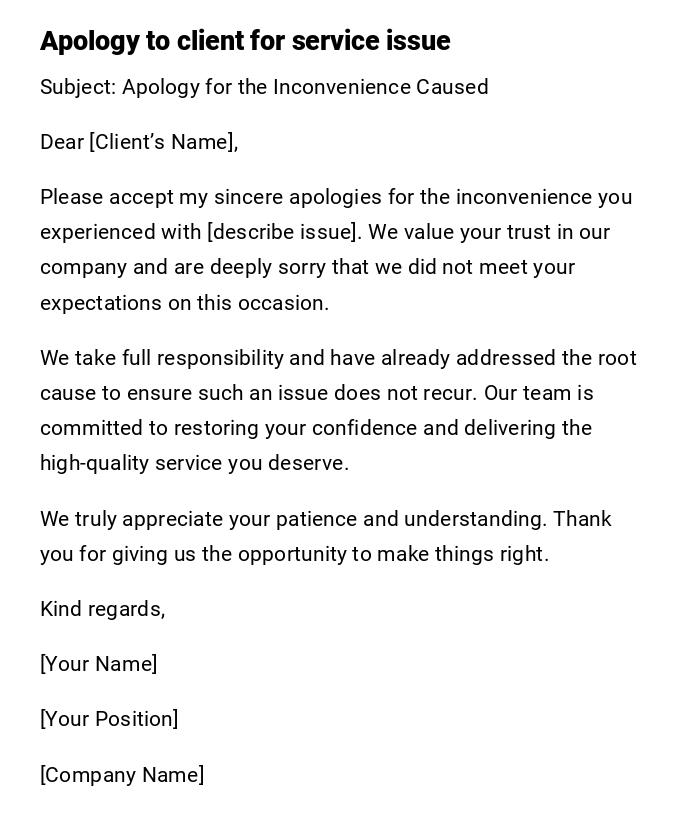
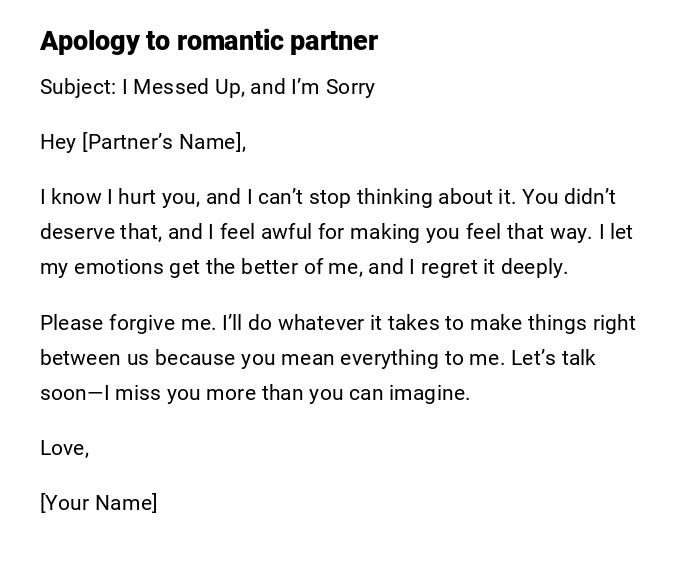
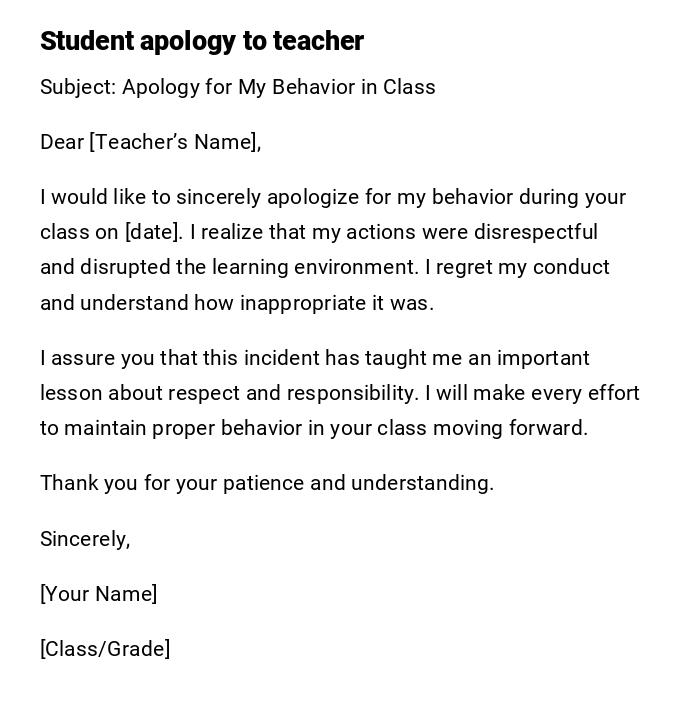
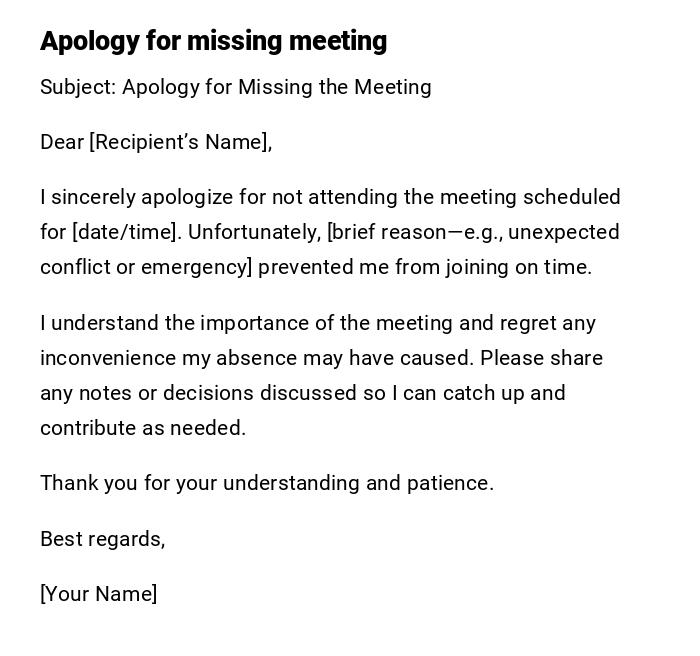
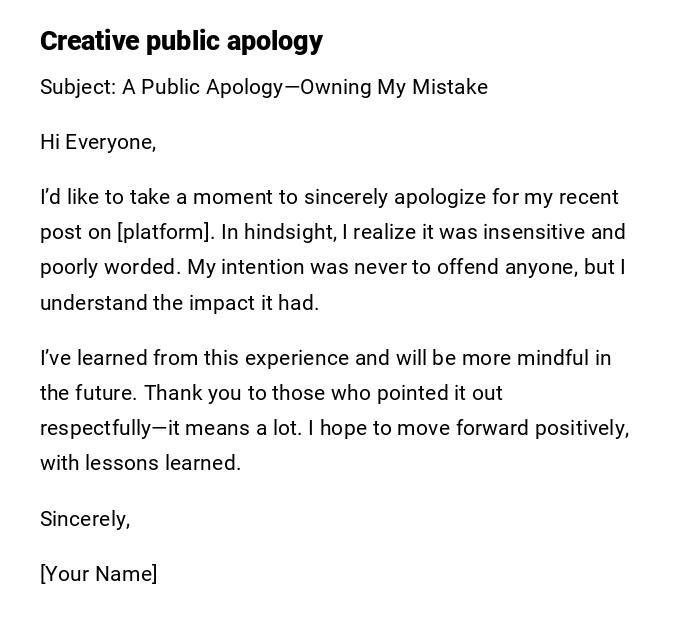
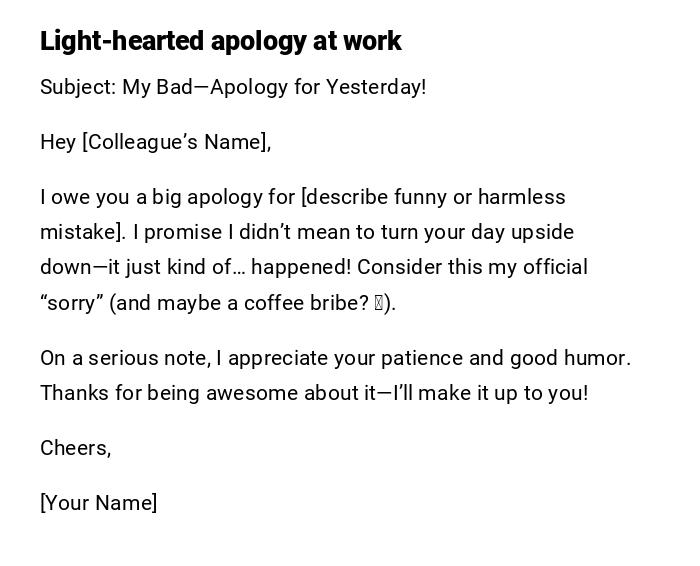
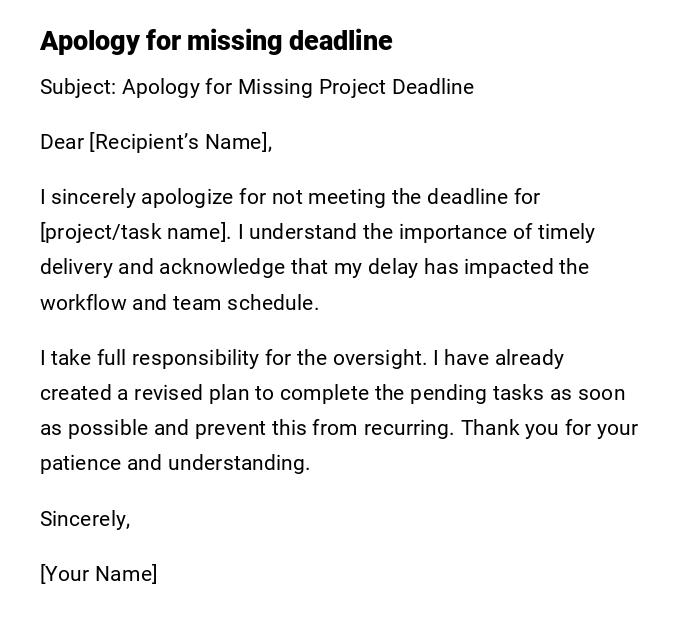
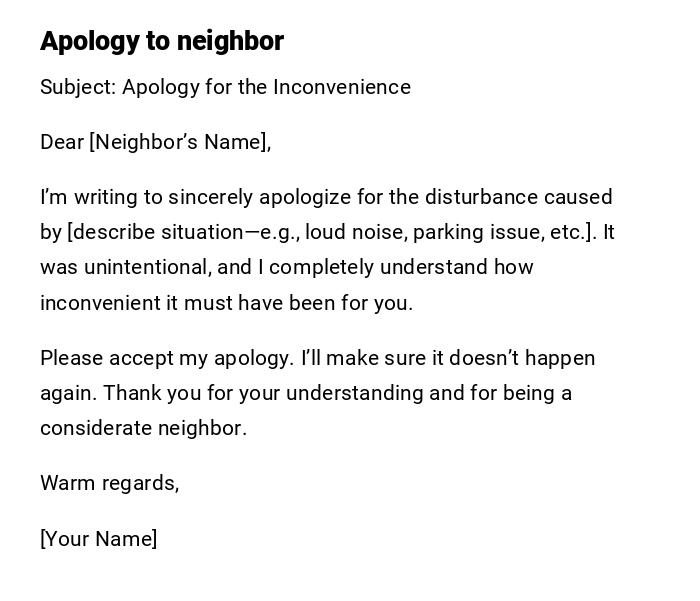

 Download Word Doc
Download Word Doc
 Download PDF
Download PDF